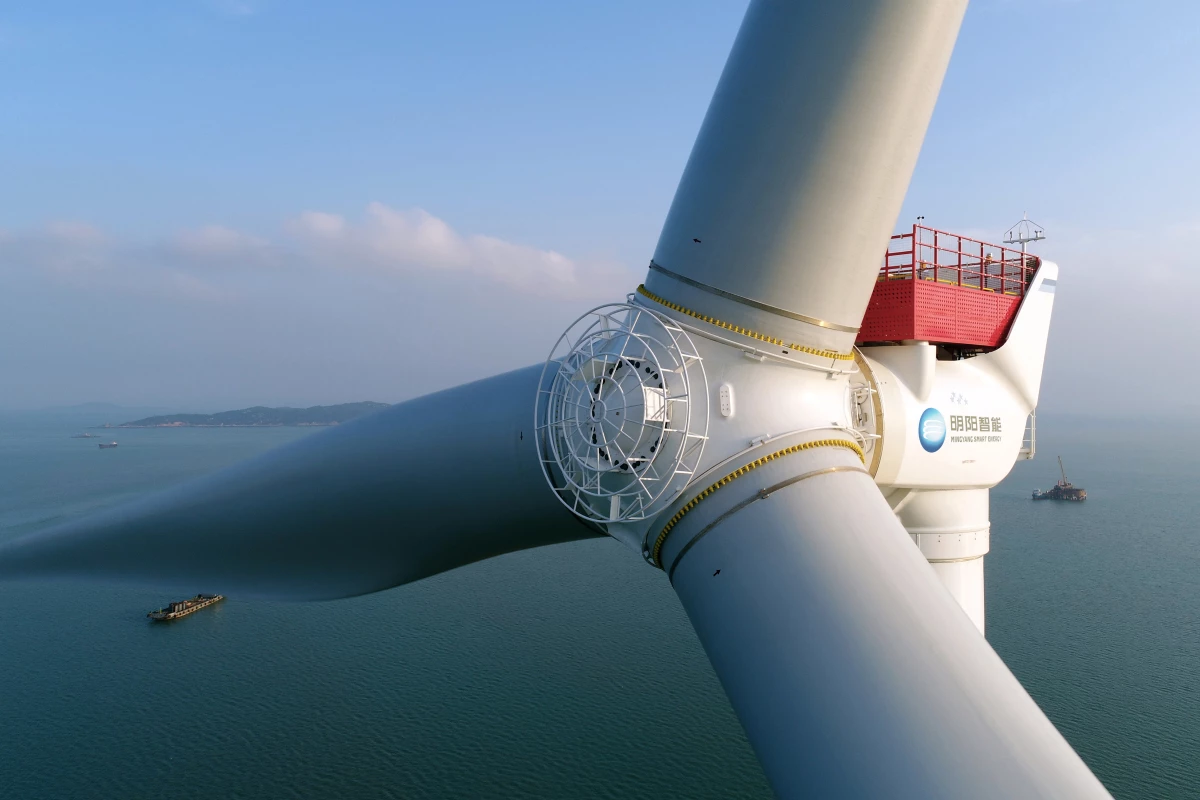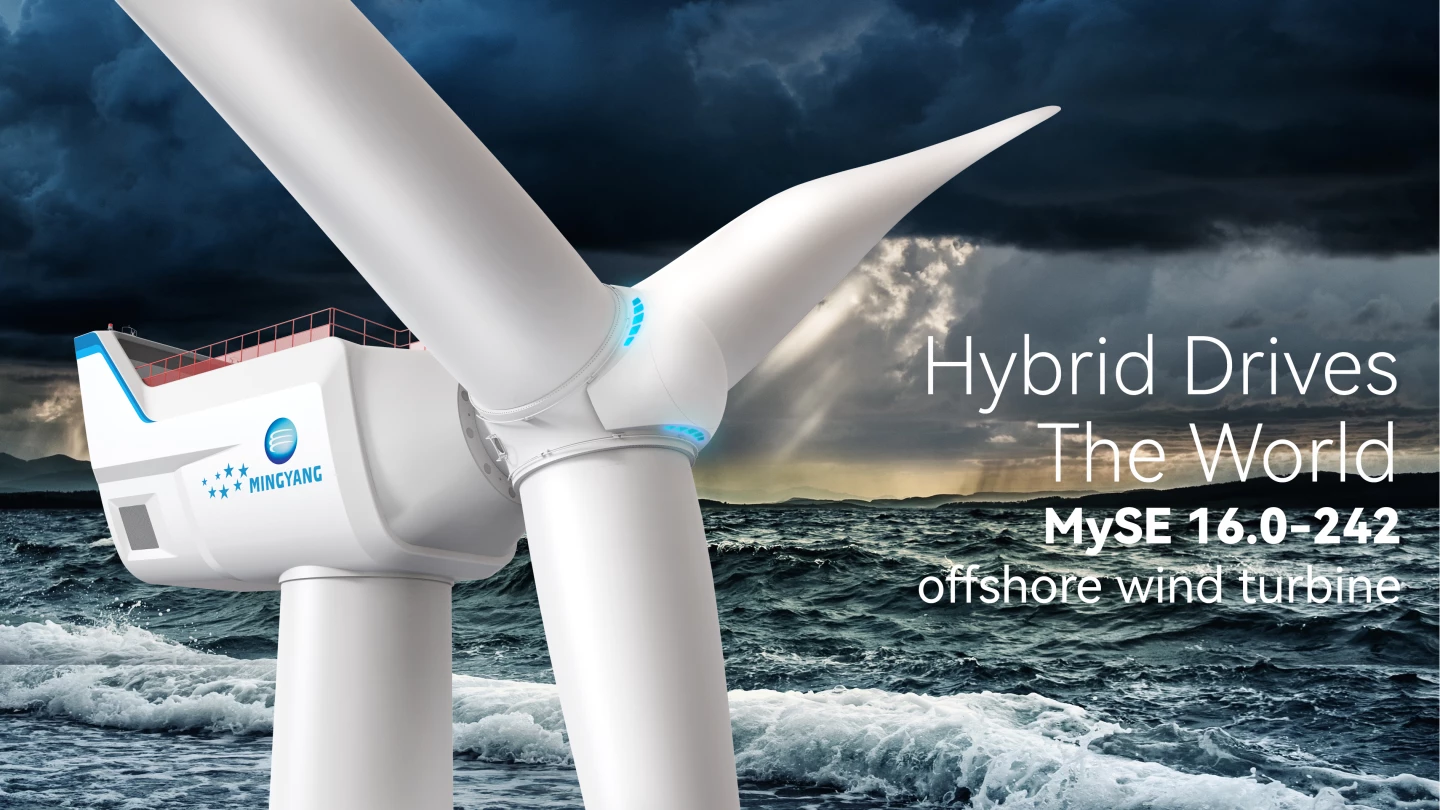
Posted on 08/24/2021 12:18:48 PM PDT by Red Badger

The bigger the wind turbine, the better the production and the economics. Hence, they're scaling up to ludicrous proportions.MingYang Smart Energy
==============================================================================
China's MingYang Smart Energy has announced an offshore wind turbine even bigger than GE's monstrous Haliade-X. The MySE 16.0-242 is a 16-megawatt, 242-meter-tall (794-ft) behemoth capable of powering 20,000 homes per unit over a 25-year service life.
The stats on these renewable-energy colossi are getting pretty crazy. When MingYang's new turbine first spins up in prototype form next year, its three 118-m (387-ft) blades will sweep a 46,000-sq-m (495,140-sq-ft) area bigger than six soccer fields.
Every year, each one is expected to generate 80 GWh of electricity. That's 45 percent more than the company's MySE 11.0-203, from just a 19 percent increase in diameter. No wonder these things keep getting bigger; the bigger they get, the better they seem to work, and the fewer expensive installation projects need to be undertaken to develop the same capacity.
The overall result should be a drop in offshore wind energy production prices – a sorely needed drop, too. Current levelized costs of energy, as estimated by the US Energy Information Administration for new energy generation assets going live in 2026, place offshore wind as the most expensive way of generating a megawatt-hour right now, at US$120.52, where ultra-supercritical coal is more like $72.78 and standalone solar is around $32.78 before subsidies.
Obviously, wind fills in gaps that solar can't, and it'll be a crucial part of the energy mix going forward. Scaling the industry up with these mammoth turbines is the key reason why industry experts are predicting that the cost of offshore wind will drop by between 37 and 49 percent by 2050, as reported by Renew Economy.
MingYang says the MySE 16.0-242 is just the start of its "new 15MW+ offshore product platform," and that it's capable of operating installed to the sea floor or on a floating base. The full prototype will be built in 2022, installed and into operation by 2023. Commercial production is slated to begin in the first half of 2024.
Source: MingYang Smart Energy

The MySE 16.0-242 will be the world's biggest offshore wind turbine, with each unit capable of powering 20,000 homes MingYang Smart Energy
90% of the time I see these things NOT spinning
I saw a bunch of them in a recent trip to Canada- what was peculiar about them was that they were ALL spinning.
It was so unusual to see that I even remarked on it at the time.
You're prediction is about 20 years too late.
You can serve it with bat soup...
Its a big blade, but only produces half the year. So it sits idle for days and days because no useful wind!
No one knows this. By the way, 50% capacity factor is a great wind deal!
Reminds me, the 2 fastest versions of Tesla cars are the “ludicrous” and “plaid” options.
CC
China lies, so their claims are suspect.
Each single blade is 87' longer than a football field! The last that I heard was the the 'Wind Industry' is trying to figure out how to recycle / dispose of these blades after a 15-20 year use cycle. Unreal!
Nonsense. Those Chinks can only steal technology and reverse engineer it.
My God you are clueless.
They led the world in new patents including the US.
They are leading in 4-5 of the disciplines that make a country a superpower.
Three blades of 384 feet each will put a heck of a strain on the bearings, I’d say. Lot of engineering going into this is if it’s going to work.
Plaid is only $139,900.
I have that laying around somewhere...
“Wind a solar is a commie plot to make electricity expensive and scarce.”
What an idiotic statement.
“Nonsense. Those Chinks can only steal technology and reverse engineer it.”
China has led the world in number of patent filings since 2011, according to the World Intellectual Property Indicators 2020 report from the World Intellectual Property Organization (WIPO). In 2019, WIPO reports, China filed 1.4 million patents, or 43.4 percent of the world’s total patent applications that year
Yes meteorology is thought to be perhaps the most difficult of the physical earth sciences.
One theory to research is the “Butterfly Effect”.
From Wikipedia: “In chaos theory, the butterfly effect is the sensitive dependence on initial conditions in which a small change in one state of a deterministic nonlinear system can result in large differences in a later state.
The term is closely associated with the work of mathematician and meteorologist Edward Lorenz. He noted that butterfly effect is derived from the metaphorical example of the details of a tornado (the exact time of formation, the exact path taken) being influenced by minor perturbations such as a distant butterfly flapping its wings several weeks earlier.[citation needed] Lorenz discovered the effect when he observed runs of his weather model with initial condition data that were rounded in a seemingly inconsequential manner. He noted that the weather model would fail to reproduce the results of runs with the unrounded initial condition data. A very small change in initial conditions had created a significantly different outcome.
The idea that small causes may have large effects in weather was earlier recognized by French mathematician and engineer Henri Poincaré. American mathematician and philosopher Norbert Wiener also contributed to this theory. Edward Lorenz’s work placed the concept of instability of the Earth’s atmosphere onto a quantitative base and linked the concept of instability to the properties of large classes of dynamic systems which are undergoing nonlinear dynamics and deterministic chaos.
The butterfly effect concept has since been used outside the context of weather science as a broad term for any situation where a small change is supposed to be the cause of larger consequences.”
Who wants to take bets on when a good storm will take that sucker out?
Speed of sound at sea level is about 1126 ft/s. From their info on swept area total radius is about 397 ft. That means circumference at blade tip is about 2492 ft. So if they go "faster" than one revolution every 2.2 sec (just over 27 rpm) the blade tips will exceed the speed of sound.
That doesn't account for the wind blowing past the blade tips perpendicular to the plane of rotation. That would add relative velocity, and thus slightly reduce the rotational speed at which the blade tips go supersonic.
Not much danger of this - most "normal" sized wind turbines run about 10 to 20 rpm. I'm sure they'll keep this monster turning pretty slow.
I’ve read Multiple books on Chaos Theory, or more aptly, “sensitive dependence based upon initial conditions”.
Gleick’s “Chaos: Making a New Science” was good.
Michael Crichton has a good talk about it on YouTube as well.
I recently had a long conversation with a guy who worked for Eversource. The biggest electric utility in New England.
He told me about the wind farm they were proposing to build in Nantucket sound. They were planning on installing turbines that were over 600’ tall. I think they were being built by GE.
He informed me that they ONLY produce electricity when the wind is blowing between 14-18 mph. Below that the blades do not turn. Above that the blades spin freely but the generator is not engaged.
The more turbines purchased, the cheaper they are. The bigger they are, the less the cost/KWH. Companies like GE will not sell you just one or two. You have to buy those from some other manufacturer. Most of the turbines in service today are obsolete because they are not big enough.
That the only place to put these things is offshore. Like in the North Sea.
Denmark is building facilities on two different islands to store(batteries) and distribute the power from off shore wind. From there they will send the power to Sweden, Denmark and The Netherlands as needed.
Complexity science is also used at Wall Street as well.
That, and predicting the next Black Swan...
if they are that big, how soon before we tip the world over?
Sea gulls? That thing would knock down a jet airliner.
Hell, it would disperse clouds and change the climate in unexpected ways.
Disclaimer: Opinions posted on Free Republic are those of the individual posters and do not necessarily represent the opinion of Free Republic or its management. All materials posted herein are protected by copyright law and the exemption for fair use of copyrighted works.